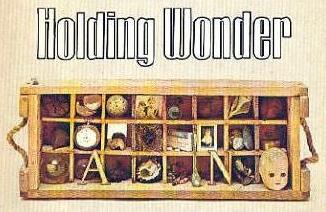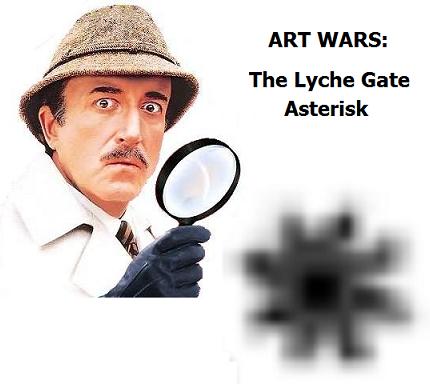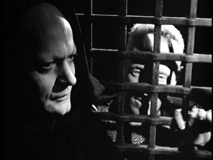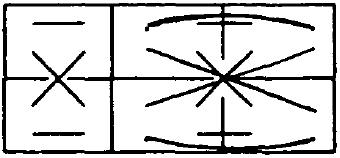"The quad gospellers may own the targum
but any of the Zingari shoolerim may pick a peck
of kindlings yet from the sack of auld hensyne."
Friday, June 9, 2023
Frame Tale …
Saturday, July 25, 2015
Frame Tale
In memory of a talented frame-maker —
From July 4, the date of his reported death:
From the next day:
Saturday, November 23, 2013
Frame Tale (continued)
See The X-Men Tree, another tree, and Trinity MOG.
Tuesday, October 1, 2013
Frame Tale
From an academic's website:
For Josefine Lyche and Ignotus the Mage,
as well as Rose the Hat and other Zingari shoolerim —
Sabbatha hanti, lodsam hanti, cahanna risone hanti :
words that had been old when the True Knot moved
across Europe in wagons, selling peat turves and trinkets.
They had probably been old when Babylon was young.
The girl was powerful, but the True was all-powerful,
and Rose anticipated no real problem.
— King, Stephen (2013-09-24).
Doctor Sleep: A Novel
(pp. 278-279). Scribner. Kindle Edition.
From a post of November 10, 2008:

Twenty-four Variations on a Theme of Plato,
a version by Barry Sharples based on the earlier
kaleidoscope puzzle version of Steven H. Cullinane
"The king asked, in compensation for his toils
during this strangest of all the nights he had
ever known, that the twenty-four riddle tales
told him by the specter, together with the story
of the night itself, should be made known
over the whole earth and remain eternally
famous among men."
Frame Tale:
"The quad gospellers may own the targum
but any of the Zingari shoolerim may pick a peck
of kindlings yet from the sack of auld hensyne."
Monday, May 24, 2021
Review
From the cover of a 1971 book of stories by Zenna Henderson —

From Frame Tale (Oct. 1, 2013) —

From Log24 posts tagged Aitchison —
"Has time rewritten every line?" — Streisand
Saturday, October 6, 2018
Monday, November 24, 2014
Metaphysician in the Dark
Continued from Friday, November 21:
Monday, November 25, 2013
Windows
Ben Brantley reviewing a show by the X-Men patriarchs
that opened on Sunday:
"This isn’t just a matter of theatergoers chuckling
to show that they’re smart and cultured and had
damn well better be having a good time after
forking out all that money…."
I prefer reality (which includes the life of Fred Kavli) :
See also Saturday's posts Chess and Frame Tale.
Whether the patriarch Kavli, pictured above, is now having
a good time, I do not know. I hope so.
Saturday, November 23, 2013
Rabbi
“We’ll give the week-end to wisdom, to Weisheit, the rabbi….”
— Wallace Stevens in “Things of August” (see Storyville yesterday)
My choice for a rabbi would be George Steiner.
|
INTERVIEWER You once referred to the “patience of apprehension” and “open-endedness of asking” which fiction can enact, and yet you have described your fictions as “allegories of argument, stagings of ideas.” Do you still consider them to be “stagings of ideas”? GEORGE STEINER Very much so. My writing of fiction comes under a very general heading of those teachers, critics, scholars who like to try their own hand once or twice in their lives. |
For one such staging, see today’s earlier posts Chess and Frame Tale.
Sunday, October 6, 2013
Sunday in the Park
(Continued from Frame Tale (Oct. 1) and
this morning's Church with Josefine.)

See Trinity Knot in this journal.
Wednesday, May 23, 2012
Tuesday, May 8, 2012
Staging the Self
| SPOILER ALERT
This post links to a column that |
The title is from a column by Stanley Fish
on The Hunger Games books in today's
online New York Times . The column
was posted at 9 PM EDT on May 7th, but I
did not see it until this morning.
Fish says—
"In the end… [spoiler details omitted]…
children… 'don’t know they play
on a graveyard'…."
For some literary background, see last night's post
on the May 7th, 2012, NY Times obituaries as well
as the May 7th, 2006, Log24 post featuring 24 squares
arranged in a rectangular frame.
See also Frame Tales and, more generally,
The King and the Corpse.
"Et cetera, et cetera, et cetera." — Yul Brynner
Thursday, September 15, 2011
Life Story
(Continued from Tuesday's "A Story")
Tuesday's story, a collection of four random posts, was
suggested by Tuesday's NY lottery numbers.
That story leads, by association, to Frame Tale in
a post of 2:02 AM on Sunday, May 23, 2010. For related
material, see Death Story, a post of 9:40 PM that same Sunday.
Wednesday's numbers—

—suggest a counter-story…
Escape to Pine Mountain
A website on films about Latter-Day Saints (i.e., Mormons) asks
Was "Escape to Witch Mountain"
based on Zenna Henderson's "People" stories?
The lottery numbers above suggest the names of three women—
none, as far as I know, with any Mormon background—
who might rightly be called, without capital letters,
"latter-day saints"…
- Madeleine L'Engle (see 529 as the date 5/29),
- June Christy (a singer first recorded on 5/4/45), and
- Mary Rockwell Hook, architect of Pine Mountain
Settlement School, who died on 9/8/78.
These three lives, taken together, may serve as
an antidote to the Death Story mentioned above.
"We tell ourselves stories…" — Joan Didion
"Therefore choose life." —God
Thursday, February 24, 2011
Now Lens (continued)
"…the farther back we manage to wiggle
the more we need the loan of a lens…." —Finnegans Wake
For some background on the lens below, see the sermon on February 20th, 2011.
“The quad gospellers may own the targum but any of the Zingari shoolerim
may pick a peck of kindlings yet from the sack of auld hensyne.”
The above "Zingari shoolerim" passage was quoted here in Frame Tales (November 10th, 2008).
That post concerned the Heinrich Zimmer tale "The King and the Corpse." Some related material—

Monday, February 7, 2011
Reappearing All Over Again
A sequel to "A Reappearing Number," "Reappearing Continued," and "Classical Requiem"—
A connection to the numerology of today's date, The Seventh— "Frame Tale." (Click, then scroll down.)
Sunday, May 23, 2010
Annals of Conceptual Art
Josefine Lyche's
"Theme and Variations" (Oslo, 2009)—
Some images in reply—
Frame Tale
Click on images for further details.
"In the name of the former
and of the latter
and of their holocaust.
Allmen."
Saturday, October 3, 2009
Saturday October 3, 2009

Related material:
Frame Tales, as well as
The Sacred Day of Kali,
this morning's
New York Times obituaries,
and
Mental Health Month, 2003:
|
|
|
Thursday, June 11, 2009
Thursday June 11, 2009
Geometry for Jews
(continued from Michelangelo’s birthday, 2003)
“Discuss the geometry underlying the above picture.”
Abstraction and the Holocaust (Mark Godfrey, Yale University Press, 2007) describes one approach to such a discussion: Bochner “took a photograph of a new arrangement of blocks, cut it up, reprinted it as a negative, and arranged the four corners in every possible configuration using the serial principles of rotation and reversal to make Sixteen Isomorphs (Negative) of 1967, which he later illustrated alongside works by Donald Judd, Sol LeWitt and Eva Hesse in his Artforum article ‘The Serial Attitude.’ [December 1967, pp. 28-33]” Bochner’s picture of “every possible configuration”–
Compare with the 24 figures in Frame Tales
(Log24, Nov. 10, 2008) and in Theme and Variations.
Monday, February 23, 2009
Monday February 23, 2009
McGee and Smee
| Project MUSE — … and interpretations, “any of the Zingari shoolerim [gypsy schoolchildren] may pick a peck of kindlings yet from the sack of auld hensyne” (FW 112.4-8). … — Patrick McGee, “Reading Authority: |
“The ulterior motive behind this essay [“Reading Authority,” above], the purpose for which I seize this occasion, concerns the question or problem of authority. I stress at the outset my understanding of authority as the constructed repository of value or foundation of a system of values, the final effect of fetishism– in this case, literary fetishism. [Cf. Marx, Das Kapital] Reading– as in the phrase ‘reading authority’– should be grasped as the institutionally determined act of constructing authority….”
“[In Peter Pan] Smee is Captain Hook’s right-hand man… Barrie describes him as ‘Irish’ and ‘a man who stabbed without offence‘….”
Background: In yesterday’s morning entry, James Joyce as Jesuit, with “Dagger Definitions.”
A different Smee appears as an art critic in yesterday’s afternoon entry “Design Theory.”–
“Brock, who has a brisk mind, is a man on a mission. He read mathematical economics and political philosophy at Princeton (he has five degrees in all) and is the founder and president of Strategic Economic Decisions Inc., a think tank specializing in applying the economics of uncertainty to forecasting and risk assessment.
But phooey to all that; Brock has deeper things to think about. He believes he has cracked the secret of beautiful design. He even has equations and graphs to prove it.”
A Jesuit in Portrait of the Artist as a Young Man:
“When may we expect to have something from you on the esthetic question?”
“Our entanglement in the wilderness of Finnegans Wake is exemplified by the neologism ‘Bethicket.’ This word condenses a range of possible meanings and reinforces a diversity of possible syntactic interpretations. Joyce seems to allude to Beckett, creating a portmanteau word that melds ‘Beckett’ with ‘thicket’ (continuing the undergrowth metaphor), ‘thick’ (adding mental density to floral density)…. As a single word ‘Bethicket’ contains the confusion that its context suggests. On the one hand, ‘Bethicket me for a stump of a beech’ has the sound of a proverbial expletive that might mean something like ‘I’ll be damned’ or ‘Well, I’ll be a son of a gun.’….”

At the Oscars, 2009
Related material:Frame Tales and Dickung
Saturday, November 29, 2008
Saturday November 29, 2008
A Story
for Madeleine
Part One: Frame Tale
Part Two: A Little Princess
Part Three: Happy Birthday
Monday, November 24, 2008
Monday November 24, 2008
Sunday, November 23, 2008
Sunday November 23, 2008
“The first credential
we should demand of a critic
is his ideograph of the good.”
— Ezra Pound,
How to Read
Music critic Bernard Holland in The New York Times on Monday, May 20, 1996:
The Juilliard’s
Half-Century RipeningPhilosophers ponder the idea of identity: what it is to give something a name on Monday and have it respond to that name on Friday regardless of what might have changed in the interim. Medical science tells us that the body’s cells replace themselves wholesale within every seven years, yet we tell ourselves that we are what we were….
Schubert at the end of his life had already passed on to another level of spirit. Beethoven went back and forth between the temporal world and the world beyond right up to his dying day.
Exercise
Part I:
Apply Holland’s Monday-to-Friday “idea of identity” to the lives and deaths during the week of Monday, Nov. 10 (“Frame Tales“), through Friday, Nov. 14, of a musician and a maker of music documentaries– Mitch Mitchell (d. Nov. 12) and Baird Bryant (d. Nov. 13).
Part II:
Apply Holland’s “idea of identity” to last week (Monday, Nov. 17, through Friday, Nov. 21), combining it with Wigner’s remarks on invariance (discussed here on Monday) and with the “red dragon” (Log24, Nov. 15) concept of flight over “the Hump”– the Himalayas– and the 1991 documentary filmed by Bryant, “Heart of Tibet.”
Part III:
Discuss Parts I and II in the context of Eliot’s Four Quartets. (See Time Fold, The Field of Reason, and Balance.)
Monday, November 10, 2008
Monday November 10, 2008
Frame Tales
From June 30 —
("Will this be on the test?")
Frame Tale One:
|
Summer Reading
Subtitle: |
Frame Tale Two:
Barry Sharples
on his version of the
Kaleidoscope Puzzle —
Background:
"A possible origin of this puzzle is found in a dialogue
between Socrates and Meno written by the Greek philosopher,
Plato, where a square is drawn inside a square such that
the blue square is twice the area of the yellow square.

Colouring the triangles produces a starting pattern
which is a one-diamond figure made up of four tiles
and there are 24 different possible arrangements."

"The king asked, in compensation for his toils during this strangest
of all the nights he had ever known, that the twenty-four riddle tales
told him by the specter, together with the story of the night itself,
should be made known over the whole earth
and remain eternally famous among men."
Frame Tale Three:
"The quad gospellers may own the targum
but any of the Zingari shoolerim may pick a peck
of kindlings yet from the sack of auld hensyne."





















